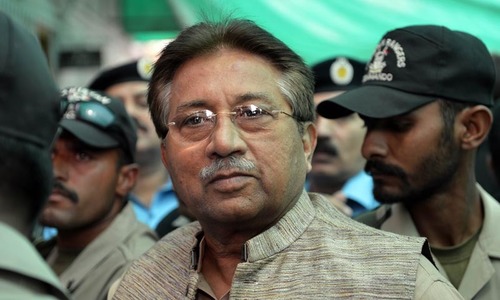LAHORE/ISLAMABAD: While the Supreme Court has directed the National Database and Registration Authority (Nadra) to unblock the computerised national identity card (CNIC) of former president retired Gen Pervez Musharraf, controversy surrounds his participation in the coming general elections as Attorney General (AG) Ashtar Ausaf pleaded before the apex court that the former military ruler is not entitled to any relief until he submits himself to the jurisdiction of the courts.
In a related development, Mr Musharraf has sought absolute guarantee from the SC that if he returns to the country he will not be arrested or barred from travelling abroad.
The SC on Monday directed Nadra to unblock Mr Musharraf’s CNIC so that he would have no excuse for not returning to the country.
A three-judge bench headed by Chief Justice of Pakistan (CJP) Mian Saqib Nisar passed the order on a verbal request made by Nadra chairman Usman Mobin.
Planning to contest polls, ex-president seeks apex court guarantee he will not be arrested on return and barred from travelling abroad
The Nadra chief stated that a previous direction by the court for the return of Mr Musharraf could not be implemented due to the blocking of his identity card.
When asked by the court, he said the process for blocking the CNIC of Mr Musharraf had already been in progress when the apex court asked him to return to the country and face the law.
“If Musharraf is still a citizen of Pakistan, let him come,” the chief justice told the Nadra chairman and allowed him to restore the CNIC and passport of the former president, who is also facing treason proceedings for abrogating the Constitution twice.
CJP Nisar observed that Mr Musharraf should not have any excuse for not returning to the country and facing the cases against him. He observed that the court had already assured him (Mr Musharraf) of protection from the airport to the court.
The chief justice also expressed concern over delay in reconstitution of a special trial court seized with the treason trial of Mr Musharraf. “It seems that the government wants to benefit someone,” the chief justice observed.
The chief justice directed the federal government to notify the special court within two days so that the treason trial against Mr Musharraf could resume.
In March this year, one of the members of a three-judge special trial court had recused himself from the treason trial after the counsel for Mr Musharraf raised an objection.
The trial court comprised Peshawar High Court Chief Justice Yahya Afridi, Lahore High Court Chief Justice Muhammad Yawar Ali and Balochistan High Court Justice Tahira Safdar. The lawyer for Mr Musharraf had raised an objection against Justice Afridi’s inclusion in the court.
CJP Nisar had on June 8 conditionally allowed Mr Musharraf to file his nomination papers to contest July 25 general elections directing him to appear before the court on June 13. The former president had challenged a 2013 verdict by the Peshawar High Court for his disqualification.
Fundamental rights
In Islamabad, AG Ausaf took a plea before the apex court on Monday that a fugitive from justice had no right to an audience before courts; therefore, Mr Musharraf was not entitled to any relief until he submitted himself to the jurisdiction and due process of the law.
Mr Musharraf could not make a case for the infringement of his fundamental rights that could result in the setting aside of the April 2013 verdict of the Peshawar High Court (PHC) which had disqualified him (Musharraf) for life after holding him ineligible to contest the elections, said the AG in a reply submitted before the SC.
The reply was filed on behalf of the AG before the SC which is seized with an appeal of Mr Musharraf against the PHC order in which the appellant has requested the top court to graciously set aside the high court order because no citizen can be condemned unheard without due process of law.
The high court in April 2013 had disqualified Mr Musharraf for life after holding him ineligible to contest the 2013 elections in view of the July 31, 2009 judgement in which the apex court had declared the Nov 3, 2007 emergency illegal. As a consequence Mr Musharraf’s nomination papers for constituencies from Karachi, Islamabad and Chitral were rejected by returning officers.
Subsequently he moved an appeal against the decision in the election tribunal, but that too was dismissed.
In his reply the AG stated that the allegations against Mr Musharraf were manifold and included the placement of judges under house arrest, suppression of media, and demolition of the judicial set-up.
Meanwhile, Mr Musharraf’s nomination papers for the sole constituency of the National Assembly from Chitral were filed on Monday.
Absolute guarantee
Mr Musharraf has made his return to the country conditional on an absolute guarantee from the SC that he will not be arrested or barred from travelling abroad, reported Arab News on Monday.
“Gen Musharraf is ready to return to Pakistan but only if the Supreme Court gives an absolute guarantee that he would not be arrested in any case and allowed to run an election campaign for his party,” said Shahzad Arbi, joint secretary information of the Musharraf-led All Pakistan Muslim League.
“Nawaz Sharif and his party still have influence in the bureaucracy and we can’t trust them,” said Mr Arbi. “If the Supreme Court does not give an absolute guarantee, then there is no use in Musharraf returning to Pakistan, at least at this point.”
He said, however, that Mr Musharraf was ready to appear in court to face the cases, including a treason trial, but “it is better if hearings into all these cases are kept pending till the elections, so that Musharraf could easily lead the election campaign of his party”, according to a report posted on Arab News website.
Published in Dawn, June 12th, 2018












































